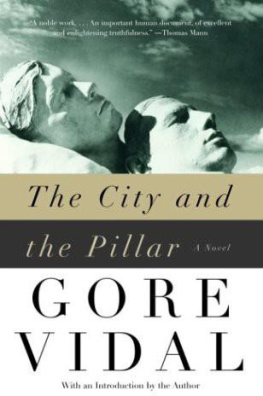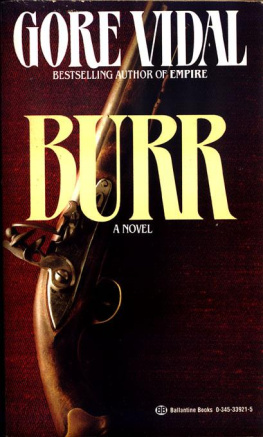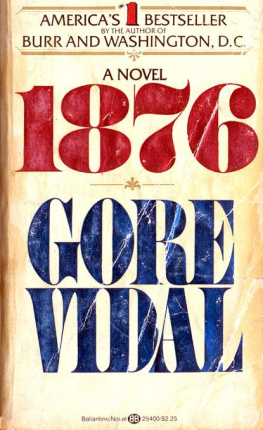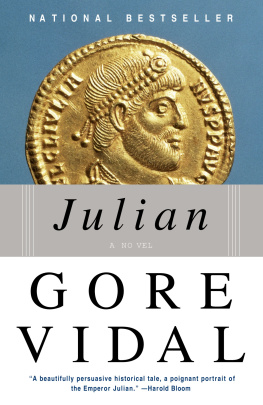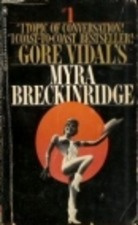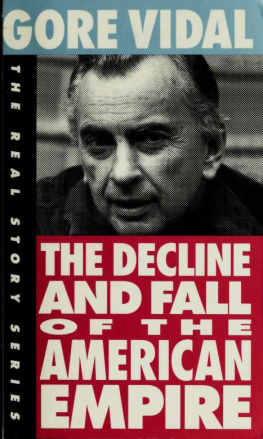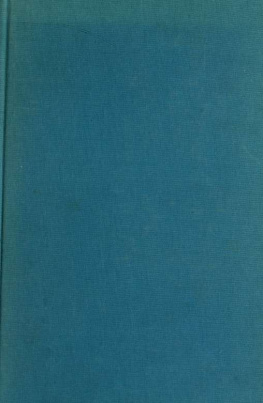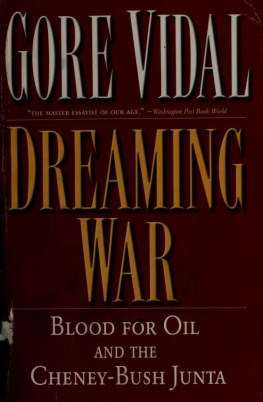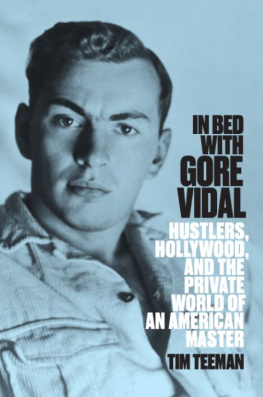

First Vintage International Edition, December 2003
Copyright 1948, 1965 by E. P. Button & Co., Inc.
Introductioncopyright 1995 by Literary Creation Enterprises, Inc.
VintageISBN: 1-4000-3037-4
www.vintagebooks.com
Printed in the UnitedStates of America
Forthe memory of J.T.
Buthis wife looked back from behind him and she became a pillar of salt.
GENESIS 19:26
INTRODUCTION
Much has beenmadenot least by the Saint himselfof how Augustine stole and ate some pearsfrom a Milanese orchard. Presumably, he never again trafficked in, much lessate, stolen goods, and once this youthful crime ("a rum business,"snarled the unsympathetic American jurist Oliver Wendell Holmes, Jr.) wasbehind him, he was sainthood bound. The fact is that all of us have stolenpears; the mystery is why so few of us rate halos. I suspect that in certainnotorious lives there is sometimes an abrupt moment of choice. Shall I marry orburn? Steal or give to others? Shut the door on a life longed for while openinganother, deliberately, onto trouble and pain because... The "because"is the true story seldom told.
My father oncetold me, after reviewing his unpleasant period in public office, that wheneverit came time for him to make a crucial decision, he invariably made the wrongone. I told him that he must turn to Churchill and write his own life,demonstrating what famous victories he had set in motion at Gallipoli or in the"dragon's underbelly" of the Third Reich. But my father was neither awriter nor a politician; he was also brought up to tell the truth. I, on theother hand, was brought up by a politician grandfather in Washington, D.C., andI wanted very much to be a politician, too. Unfortunately, nature had designedme to be a writer. I had no choice in the matter. Pears were to be my diet,stolen or homegrown. There was never a time when I did not make sentences inorder to make those things that I had experienced cohere and become"real."
Finally, thenovelist must always tell the truth as he understands it while the politicianmust never give the game away. Those who have done both comprise a very shortlist indeed. The fact that I was never even a candidate for the list had to dowith a choice made at twenty that entirely changed my life.
At nineteen,just out of the army, I wrote a novel, Williwaw (1946): it wasadmired as, chronologically, at least, the first of the war novels. The nextyear I wrote the less admired In a Yellow Wood (1947).Simultaneously, my grandfather was arranging a political career for me in NewMexico (the governor was a protg of the old man). Yes, believe it or not, inthe greatest democracy the world has ever knownfreedom's as well as bravery'shomeelections can be quietly arranged, as Joe Kennedy liked to explain to you.
For someonetwenty years old I was well situated in the world, thanks to two publishednovels and my grandfather's political skills. I was also situated dead centerat a crossroads rather like the one Oedipus found himself at. I was at work on The City andthe Pillar. If I published it, I'd take a right turn and end upaccursed in Thebes. Abandon it and I'd turn left and end up in holy Delphi.Honor required that I take the road to Thebes. I have read that I was toostupid at the time to know what I was doing, but in such matters I have alwayshad a certain alertness. I knew that my description of the love affair betweentwo "normal" all-American boys of the sort that I had spent threeyears with in the wartime army would challenge every superstition about sex inmy native landwhich has always been more Boeotia, I fear, than Athens orhaunted Thebes. Until then, American novels of "inversion" dealt withtransvestites or with lonely bookish boys who married unhappily and pined forMarines. I broke that mold. My two lovers in this novel were athletes and sodrawn to the entirely masculine that, in the case of one, Jim Willard, thefeminine was simply irrelevant to his passion to unite with his other half, BobFord: unfortunately for Jim, Bob had other sexual plans, involving women andmarriage.
I gave themanuscript to my New York publishers, E. P. Dutton. They hated it. One ancienteditor said, "You will never be forgiven for this book. Twenty years fromnow you will still be attacked for it." I responded with an uneasy whistlein the dark: "If any book of mine is remembered in the year 1968, that'sreal fame, isn't it?"
To mygrandfather's sorrow, on January 10, 1948, The City and the Pillar was published. Shock was the most pleasant emotion aroused in the press. Howcould our young war novelist...? In a week or two, the book was a bestseller inthe United States and wherever else it could be publishednot exactly a fullatlas in those days. The English publisher, John Lehmann, was very nervous. Inhis memoirs, The Whispering Gallery , he writes, "There were severalpassages in The City and the Pillar , a sad, almost tragic book and aremarkable achievement in a difficult territory for so young a man, that seemedto my travelers and the printers to go too far in frankness. I had a friendlybattle with Gore to tone down and cut these passages. Irony of the time andtaste: they wouldn't cause an eyebrow to be lifted in the climate of the earlysixties." But only twenty years ago the book was taken from Dennis Altmanas he arrived at the airport in Sydney, Australia. Altman challenged theobscenity law under which the book had been seized. The judge in the caseacknowledged that under the law that he must administer the book was obscene,but then, in a famous obiter dicta, he wrote that he thought the law absurd: indue course, it was changed. Meanwhile, even today, copies of the book stillfitfully blaze on the pampas and playas of Argentina and other godly countries.
What did myconfreres think? I'm afraid not much. The fag writers were terrified; theothers were delighted that a competitor had so neatly erased himself. I did sendcopies to two famous writers, fishing, as all young writers do, forendorsements. The first was to Thomas Mann. The second was to ChristopherIsherwood, who responded enthusiastically. We became lifelong friends. ThroughJoseph Breitbach I was told that Andr Gide was planning to write an"appreciation," but when we finally met he spoke only of ahandwritten, fetchingly illustrated pornography that he had received from anEnglish clergyman in Hampshire.
At fourteen Ihad read Thomas Mann's Joseph books and realized that the "novel of ideas" (westill have no proper phrase for this sort of book or, indeed, such a genre)could work if one were to set a narrative within history. Later, I was struckby the use of dialogue in The Magic Mountain, particularly the debates between Settembriniand Naphta, as each man subtly vies for the favors of the dim but sexuallyattractive Hans Castorp. Later, there would be complaints that Jim Willard in The City andthe Pillar was also dim. But I deliberately made Jim Willard aHans Castorp type: what else could someone so young be, set loose in theworldthe Citythat was itself the center of interest? But I did give Jimsomething Hans lacked: a romantic passion for Bob Ford that finally excludedeverything else from his life, even, in a sense, the life itself. I got apolite, perfunctory note from Thomas Mann, thanking me for my "noblework": my name was misspelled.
Contemplatingthe American scene in the 1940s, Stephen Spender deplored the machinery ofliterary success, remarking sternly that "one has only to follow thewhizzing comets of Mr. Truman Capote and Mr. Gore Vidal to see how quickly andeffectively this transforming, diluting, disintegrating machinery canwork." He then characterized The City and the Pillar asa work of sexual confession, quite plainly autobiography at its most artless.Transformed, diluted, disintegrated as I was, I found this descriptionflattering. Mr. Spender had paid me a considerable compliment; although I amthe least autobiographical of novelists, I had drawn the character of theathlete Jim Willard so convincingly that to this day aging pederasts are firmlyconvinced that I was once a male prostitute, with an excellent backhand attennis. The truth, alas, is quite another matter. The book was a considerableact of imagination. Jim Willard and I shared the same geography, but littleelse. Also, in the interest of verisimilitude I decided to tell the story in aflat gray prose reminiscent of one of James T. Farrell's social documents. Therewas nothing fancy in the writing. I wanted the prose plain and hard.
Next page
